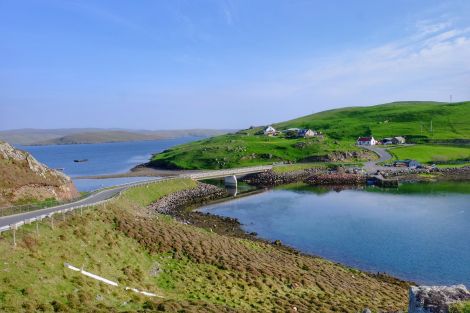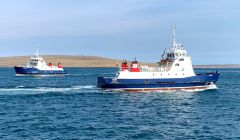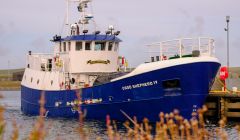Council / SIC keen to see new islands plan drawn up
The council ‘strongly favours’ a new funding model for money coming through the Scottish Government’s national islands plan
SHETLAND Islands Council (SIC) has advocated the Scottish Government creating a new national islands plan amid concern that the current scope is too wide and had raised expectation levels too much.
The council also “strongly favours” a new model that would remove the competitive bidding process for funding which would come through the islands plan.
Instead, the SIC proposes a model based on “locally-developed investment plans which articulate local priorities over the short to medium term”.
Scotland’s first National Islands Plan was published in 2019, and it stemmed from the Islands Act legislation introduced the year prior.
The aim of the plan was to “set out the main objectives and strategy of the Scottish ministers in relation to improving outcomes for island communities that result from, or are contributed to by, the carrying out of functions of a public nature”.
It set out 13 strategic objectives and more than 100 commitments on topics such as population levels, transport, housing and health, which must be delivered over the five-year lifetime of the plan.
A consultation was held last year to review the progress of the plan.
One of the respondents of the consultation was the SIC, and when asked about the effect of the islands plan the council indicated there may be a lack of awareness among communities as to whether the plan has affected their lives.
“Scottish Government has achieved many positive things for the islands over the past five years, but it is questionable how many of those the public would associate with the plan and also how many would have been delivered regardless of whether a National Islands Plan existed,” the council said.
The SIC also felt the scope of the current plan was too wide; “in our view, this has meant the plan lacks essential focus on the key things it was seeking to achieve,” it added.
Become a member of Shetland News
“By setting so many priorities, with over 130 commitments, it perhaps raised island communities’ expectation levels beyond what could reasonably be delivered with the level of resources that were allocated for delivery,” the council continued.
The SIC said it is supportive of the government having high ambitions for supporting the islands, but added it would like to see a new plan that sets out priorities for improving outcomes particularly in areas like housing, affordable transport and sustainable economic development.
“But these also need to be realistic at the outset or communities will continue to question what purpose the plan serves,” the council wrote.
The SIC did praise the plan’s thorough and evidence-based document, and its annual reporting.
But it questioned the public engagement the lengthy plan has had.
Advocating a new plan, the council noted the “burdens” on local authorities which it said has increased over the last 12 months, resulting in the SIC having to resource additional activity.
This included coordinating the competitive bidding processes for the UK Levelling Up fund and the Scottish islands programme, and leading local activity for the proposed visitor levy.
The SIC said this activity has been required to be delivered by existing resources, and has been “exacerbated by uncertainty over future budget availability and central government strategies”.
“It is extremely difficult for local authorities to make resource plans when the status of external funding arrangements is not known, and often only confirmed within the financial year in which it is to be delivered,” the council added.
“The, at times onerous, time restrictions also creates difficulties for local authorities in resourcing programmes of activity and ensuring spending commitments are kept to, which impacts on the ability of authorities to target and deliver funds to best effect.”
The SIC said it would support investment plans developed by councils for funding through the islands plan, which could “help to align national and local priorities”.
It warned that in an “environment of reducing resources from government and significant pressures on council budgets”, that activity which has a positive effect on communities may be lost due to funding constraints and “tough decisions having to be made”.
The SIC also said it welcomed the announcement of £30 million to assist with the delivery of the plan, but it said in reality the “sum and the distribution mechanism could never fund the scale of positive change originally envisaged”.
“It remains the case that the major issues which impact on island communities are entirely outwith the ability of relatively modest annual resource allocations to address,” the consultation response added.
This includes external and internal transport links, digital connectivity and the high cost of living/fuel poverty.
“At this stage, it is difficult to see how investments from the National Islands Plan have shifted the dial on the issues highlighted above, which are at the heart of improving and maintaining the social and economic wellbeing of island communities,” the SIC said.
“We would therefore ask that new funding be identified as the National Islands Plan is being developed, so that island communities can have confidence Scottish Government is backing up its ambition with the scale of resources that would deliver on the more focused commitments it contains.”
The SIC also highlighted that it is “vital that the new sources of Scottish Government income from renewable energy schemes around our islands are shared in a fair and equitable manner, particularly at a time when our households are having to pay some of the largest energy bills in the country and are suffering severe fuel poverty”.
It comes as the Scottish Government stands to financially benefit to a significant degree from offshore wind projects through Crown Estate Scotland’s ScotWind project.
The government said the review may lead to the publication of a new islands plan.
“The Scottish Government wants to work together with local authorities, island communities and relevant sectors and partners to ensure this process is as thorough and effective as possible, providing us with vital feedback from those most impacted by the National Islands Plan,” it added.
The government said the Islands Act introduced measures to underpin its objective of “ensuring that there is a sustained focus across government and the public sector to meet the needs of islanders – now and in the future, with the aim of improving outcomes for communities”.
Speaking when the plan was published in 2019, then islands minister Paul Wheelhouse MSP said: “Our islands are profoundly important – not just to Scotland, but to the whole world.
“They contribute hugely to our culture, heritage, environment, identity, landscape, economy and society. We want them to thrive and this first National Islands Plan provides the ambition and the tools to do so.”
Become a member of Shetland News
Shetland News is asking its many readers to consider paying for membership to get additional features and services: -
- Remove non-local ads;
- Bookmark posts to read later;
- Exclusive curated weekly newsletter;
- Hide membership messages;
- Comments open for discussion.
If you appreciate what we do and feel strongly about impartial local journalism, then please become a member of Shetland News by either making a single payment, or setting up a monthly, quarterly or yearly subscription.















































































